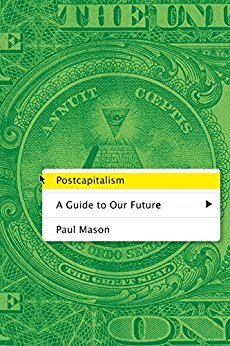Postcapitalism: A Guide to Our Future by Paul Mason
Mason is an experienced British writer and TV news editor covering economics and public policy. His future vision fuses artificial intelligence, automation, environmental problems, and wonky strategies to cure our global economic mess. Having seen policy made in central government sausage grinders, he pulls few punches.
After reviewing a variety of historical economic systems and theories all around the world, Mason concludes that none are capable of addressing our coming crises. He describes how the Russian economy converted to state communism in the 1920s – and why it failed. He relates how by 1990 a qualitatively different economy was upsetting the old system. For example, the old industrial accounting framework can’t value information assets. He explains the crash of 2008 and the rise of huge wealth gaps. But he puts no stock in prior economic philosophies to resolve these issues. He proposes a new one, Postcapitalism.
Capitalism is in deep trouble. Why are carbon-based corporations frantically debunking climate change? Because their primary assets are in the ground, and if they are never burnt, their very corporate existence is threatened. And they correctly fear that coping with environmental devastation will collapse all industrial capitalism – along with the one percent’s wealth. It will also deflate trillions in investment funds for retirement, education, and health benefits. Globally debt of all kinds is rising rapidly past $200 trillion, headed for $300 trillion. Credible ways to repay it are evaporating. Unable to cope, the whole system is unraveling.
After a long history tour, Mason pitches Postcapitalism. It’s loaded with public policy recommendations based on the argument that information and relationships are impossible to value by a capitalist framework. Its top-level aims are to:
- Rapidly reduce carbon emissions, prevent an energy crisis, and mitigate the chaos of transition. (Without saying it, Mason assumes that alternative sources of energy can supplant the phase-out of fossil fuels.)
- Stabilize the financial system between now and 2050. Socialize it to eliminate the boom-bust cycles that destroy economic stability. Then we can concentrate on problems like aging populations, climate change, and the debt overhang. (Mason is aware of other environmental issues, but considers energy availability to be primary. And yes, guaranteed income is in his prescription, but information should be nearly free, so much of what we now pay for should be free.)
- Deliver high levels of material prosperity and well being to the majority of people. Deploy information-rich technologies toward resolution of major social challenges, such as ill health, welfare dependency, sexual exploitation, and low quality education.
- Harness technology to promote rapid transition toward an automated economy. Eventually, Postcapitalism will arrive. Then much work will be voluntary social exchange, and basic commodities and public services will be free. Within that kind of system we can focus economic management on energy and resources, not capital and labor.
Mason’s environmental projections may be too rosy, but you can stir your own thinking from his economic policy proposals, where he is on home turf. Public policy assumes a strong government earning enough public trust that a “political” decision making process can guide big social transformations. Some environmentalists dubious of this are taking action bottom up at the grass roots level – just do it. Top down environmentalists agitate for regulation of corporate or government organizations, but they are determined to preserve the status quo; it benefits them.
Mason straddles this divide, holding that large-scope change requires a government to reset the rules, top down. One the other hand, these rules must favor decentralization, lateral network communication, and rapid learning – because escaping hierarchical control will make things work better. Postcapitalism is the guide to these new rules, presuming that information should be free, or nearly so. For example, intellectual capital laws should merely let innovators get a little reward after recovering their money, not become stinking rich. And the reward is not transferrable, letting heirs of an innovator live on unearned profits (“rent” in economists’ lingo). Without changes like this, we’re on the path to high tech feudalism – and learning stagnation.
But who is going to drive this revolution? Educated precariats; that’s who, and this shift has been bubbling a long time. A fascinating chapter of the book relates how revolts of educated workers in every warring country nearly derailed hostilities in WWI. The Red Revolution in Russia that occurred during WWI had counterparts in other countries.
From Occupy Wall Street to the Arab Spring, this fundamental revolt is continuing, masked by hostilities between older social values trying to hang on – but can’t. From this chaos, a Postcapitalism world has to emerge. Strong financial and hierarchical control has to yield to people doing what they need to do to improve their own quality of life using networked organization. After all, if process visibility became so good that all workers can see what is happening, they don’t need a boss who doesn’t know any more than they do – and whose biased self-interest no longer serves a social purpose. Mason is unfamiliar with the similar argument for people-centered leadership in lean.
Neoliberal critics dismiss the book as “incoherent Marxist history.” Advocates question Mason’s vision, but praise it as provoking new ideas about how the future may unfold.

